Studies in this area show that the main cause of colitis lies in the sensitivity of immunity to different bacteria penetrating the gut. It is known that the colon is a lot of bacteria that healthy people are not in conflict with the immune system.
Patients diagnosed with ulcerative colitis in blood antibody acting against tissues of the intestine.
There is another assumption that ulcerative colitis occurs in those people who are genetically predisposed. For example, if a family have a blood relative was ulcerative colitis, in the family from this disease suffer 15 times more often.
To encourage the development of the acute phase of colitis can following lifestyle:
- the systematic use of alcoholic drinks in large quantities;
- frequent overeating spicy food;
- nervous strain;
- intestinal infection;
- a failure in the power mode.
These factors affect the development of the inflammatory process, which will increase due to a congenital tendency. Colitis in ulcerative form is a rare disease. The statistics are such that per 100 000 of the examined UC is diagnosed in 80-90 of people, less than 1 %. There are also reports that excessive consumption of adult dairy products can become, if not the cause of the outbreak of the disease, its aggravation for sure. Thus, we can conclude that scientists do not fully reveal the nature of occurrence of nonspecific colitis. However, this begs the capabilities of modern medicine to treat disease.
Ulcerative colitis is a disease, based on the inflammatory process in the intestine, occurring in the chronic form. Ulcerative colitis in most cases develops in males aged from 20 to 40 years or from 50 to 70 years. The clinical picture of ulcerative colitis is manifested in the form of pain in the abdomen, diarrhea with blood, bleeding in the intestines and other signs. The diagnosis is established by endoscopic fence material, barium enema, CT and colonoscopic examinations. Treatment can be done in two ways – therapy and surgery.
Symptomatic picture
The symptoms of ulcerative colitis the intestine is directly dependent on the shape and course of the disease. Distinguish between acute and chronic type of disease. The acute phase is accompanied by pronounced symptoms, however, diagnosed is only 5-7 %. The clinical picture of symptoms is divided into local and General.
Local for colitis of the bowel makes itself felt as follows:
1. Defecation feces together with the blood secretions, mucus and pus. Often the blood is not a part of defecation, but only cover it. Color varies from deep red to dark tones. In other diseases, for example, ulcers, blood black.
2. Loose stools and constipation. In 90% of cases diarrhoea accompanies ulcerative colitis. The chair goes up to four times per day. This characteristic symptom of the false desires that can reach 30 times per day. Constipation can occur only if an inflammatory lesion located in the rectum.
3. Pain in the lower abdomen. Cramping spasms can be intense, and to be tingling. If this symptom increases, it suggests a deep failure of the intestine.
4. Bloating.
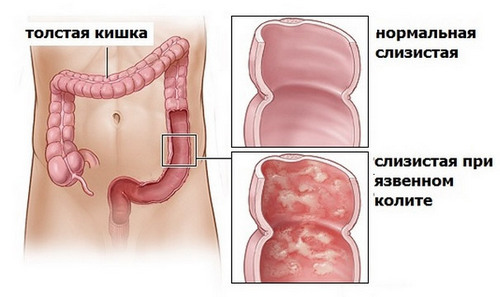
Common symptoms of ulcerative colitis of the intestine include:
- Body temperature increases up to 38-39 degrees, but this is only possible in severe forms of the disease.
- High fatigue, apathy, weight loss – this symptom says about the rapid loss of proteins.
- Disorders of visual function. When this symptom is observed inflammation of the iris and mucous membranes of the eyes, blood vessels. However, this manifestation of the disease is rare.
- Laboratory analysis shows a narrowing of the intestine, and the intestine on the tube.
- The intestinal mucous membrane secretes blood, presence of ulcers of different shape and more.
- Pain in joints and muscles.
For ulcerative colitis caused by overgrowth of inflammatory lesions in the colon. For ulcerative colitis characterized by phase manifestation, that is, aggravation replaced remission and Vice versa. If left untreated, it will spread farther through the intestines. The state of relapse will increase over time. There’s also the risk of complications, which aggravate the situation. However, if a timely appeal to the specialist and get the correct treatment, the patient has all the chances to achieve long-term remission.
Consider forms of colitis:
1. Easy – bowel movement more than three times per day, with minor bleeding, vitals are normal.
2. Average – the chair 6 times per day, significant bleeding, fever, rapid pulse, decrease in hemoglobin level.
3. Heavy bowel movement 6 times or more during the day, excessive bleeding, body temperature above 38 degrees, the hemoglobin – 105.
Ulcerative colitis in children is most often seen in adolescence. The main symptoms of bowel disease is severe diarrhea and delayed growth of the skeleton. Therefore, the child lags behind in development for unknown reasons. As a result, it is necessary to consult a doctor to conduct a full examination in order to exclude ulcerative colitis.
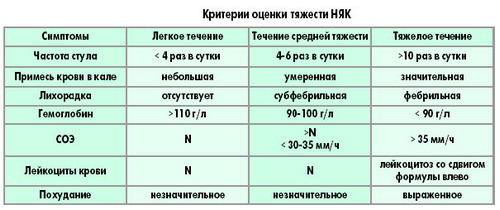
Diagnostic methods
Upon detection of the above symptoms the patients should immediately refer to a gastroenterologist. If these signs of colitis bowel have baby, need to visit the therapist’s office.
Diagnosis at the doctor’s is as follows:
1. Conversation. Allows you to identify the complaints. Of particular interest is the presence of blood and its quantity in the faeces and color.
2. Inspection. For the reason that the symptoms manifest themselves in the eyeballs, first examine them. Necessary to diagnosis may involve an ophthalmologist.
3. Palpation. In ulcerative colitis the large intestine is sensitive to palpation. And with a deep study of a markedly enlarged colon in inflammation.
If the doctor confirms suspected ulcerative colitis, the patient is sent for tests:
1. Blood. Helps to interpret low hemoglobin and high white blood cell count.
2. Biochemical blood sampling. Ulcerative colitis with positive results are: an increase in C-reactive protein, lower levels of calcium, magnesium, albumin, high number of gamaglobulin.
3. Immune test. If the patient is sick, the number of antineutrophil antibodies will be increased.
4. Examination of feces. In the lab a lot study on the presence of mucus and pus.
For the production of a correct diagnosis in addition to symptoms and findings of the survey, doctors recommend additional diagnostics colitis.
These include:
- endoscopy;
- rectosigmoidoscopy;
- colonoscopy.
Before endoscopy, the patient undergoes a preparatory phase, which consists of:
- 12 hour diet prior to the study;
- refusal of food for 8 hours;
- the colon cleansing (enemas or taking special drugs);
- moral training, consult a doctor.
In the diagnosis of ulcerative colitis method of rectosigmoidoscopy the patient is prepared similarly to endoscopic. The survey is an inspection of the rectum with a special instrument equipped with a micro-camera. Through visual projections on the screen of the monitor the physician can look at inflammatory foci. Through this study, in 90% of cases it is possible to diagnose ulcerative colitis and other bowel diseases.
Colonoscopic examination allows you to study the upper region of the colon. Rarely used, in contrast to the previous method. Needed to determine the extent of colitis and to exclude other diseases, for example, colon cancer. During diagnosis, the doctor makes a fence of tissues for later study.
The first diagnosis of ulcerative colitis should be done no later than 7 years after diagnosis of colitis. In the future, it must be repeated once in 2 years, depending on the disease.
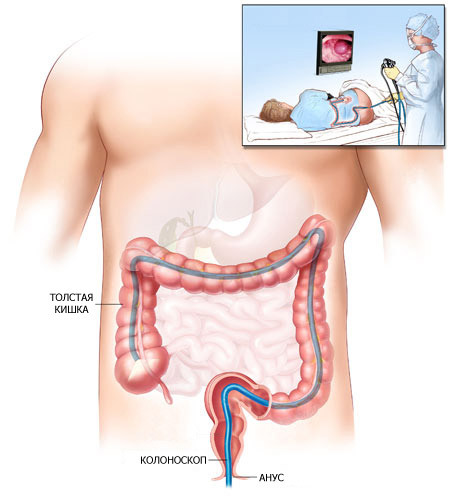
Drug therapies
Effective treatment of ulcerative colitis is possible only from a qualified doctor. When heightened for ulcerative colitis, is the patient in hospital where to observe strict bed rest until the intensity of the symptoms does not decrease. At the time of remission, the person continues to lead a normal lifestyle with consideration of the recommendations of a physician regarding medication and diet.
Drug therapy colitis includes:
- Medications category aminosalicylates, namely Sulfasalazine in the acute phase to 1 g four times per day. During remission ulcerative colitis – 0.5 g in the morning and evening.
- Treatment of colitis with Mesalazine more often prescribed in the acute form 1 g three times a day.
- To cure ulcerative colitis, additionally use candles and enemas.
- If severe colitis Prednisolone use 50-60 milligrams a day rate of 3-4 weeks.
In some cases, the doctor appoints reception of Cyclosporine-A, which is relevant with the rapid development of colitis in the acute phase. The dose amount of 4 mg per 1 kg of body weight administered intravenously. Symptomatic treatment of nonspecific colitis is as of pain medicine (Ibuprofen, Paracetamol and others) and the b vitamin C.
Ulcerative colitis in a child can be cured by eating a healthy diet. The doctor in 95% of appoint a “nut table No. 4 by Pevsner”. The menu mainly consists of protein through eating meat, fish and eggs.
The mainstay of medical treatment of colitis in children is Sulfasalazine and other drugs with a Mesalazine. Taking medications orally or are injected with the help of enemas or suppositories. Dosing and course are determined individually. Along with these activities is the elimination of symptoms.
However, if adequate therapy is not available, there is a risk of complications of colitis that occur in the following way:
- a severe form of intestinal bleeding;
- bowel perforation resulting in peritonitis;
- the formation of purulent wounds;
- dehydration;
- infection blood;
- kidney stones;
- increase risk of development of cancer.
If time does not begin to treat the disease in 7-10% of cases it leads to death, and 45-50 % – to the disability group.
Nutrition tips
The basic rule of preventive treatment is diet. Of course, the importance of an annual gut check and testing.
The main principles of the diet for ulcerative colitis:
- meal, steamed or boiled;
- meals consumed in the form of heat;
- the fractional portions, 4-5 times a day;
- do not overeat;
- the last meal – no later than 7 PM;
- high-calorie foods;
- the diet should also contain lots of proteins and vitamins.
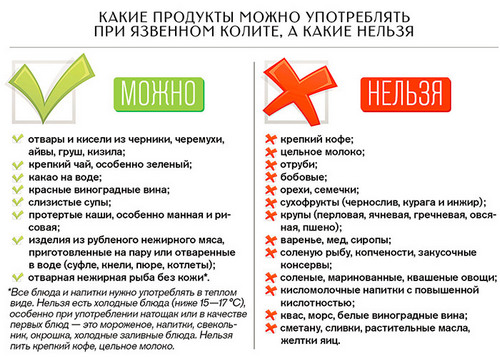
It is necessary to abandon the following products due to the fact that they irritate the lining of the colon. This in turn leads to stimulation of the inflammatory process. And some increase diarrhea. These tips are relevant for children, as they are the mainstay of treatment of ulcerative colitis.
The list of prohibited products:
1. alcohol and carbonated beverages;
2. dairy products;
3. mushrooms;
4. fatty meat;
5. drain;
6. spices of any kind;
7. cocoa, strong brewed tea;
8. tomatoes in their raw form;
9. mayonnaise, ketchup and mustard;
10. vegetables raw;
11. nuts, seeds and corn (aka popcorn);
12. plants of the legume family.
The diet should include:
- fresh fruits and berries;
- cereals;
- eggs in boiled form;
- chicken and rabbit;
- tomato and orange juice;
- lean fish;
- the liver;
- cheeses;
- gifts of the sea.
Proper nutrition and a healthy lifestyle allows patients to increase the remission phase, to reduce pain and improve body tone. To treat the initial stage of ulcerative colitis to only a complex, observing the diet diet and doctor’s recommendation regarding therapeutic techniques.
Prognosis and prevention of ulcerative colitis
Specific preventive methods with regards to the disease in present. Due to the fact that the source of the disease is still unknown. However, there is a warning treatment of colitis, which may decrease the risk of relapse. It is necessary to act as the doctor says. This applies to both adults and children.
Basic tips doctors for the prevention of ulcerative colitis are as follows:
- follow the instructions on nutrition;
- reduce stressful situation;
- not physically overexert;
- make an appointment with a therapist to relieve psychosomatic causes;
- regularly observe from a gastroenterologist;
- practice of sanatorium-resort therapy.
Almost every person suffering from this disease, asks two questions: is it possible to permanently cure the disease, and what is the life expectancy. Answering the first question, it should be noted that all depends on the form of ulcerative colitis, complications and timely treatment. In other words, yeah, observing the prescriptions of physicians.
Regarding the second question, you need to understand that colitis in the ulcerative form may occur in a person’s life. But how long people live with this diagnosis primarily depends on the patient. If you fulfill all the recommendations, monitor the health and proper lifestyle, the patient has all the chances to die of old age. Prognosis is favorable in the case if the treatment were used all modern techniques. Relapses then occur at least a couple of times in 5-7 years and at the optimum time are reduced by medical drugs.
Summing up the review, note that colitis responding to therapy, however, requires a person to adhere to preventative courses. Start the disease should not be – what this means, is already known. We remind you that the annual examination of the body, regardless of the sick person or healthy, allows to reveal diseases at early stages, which greatly simplifies the life of patients.


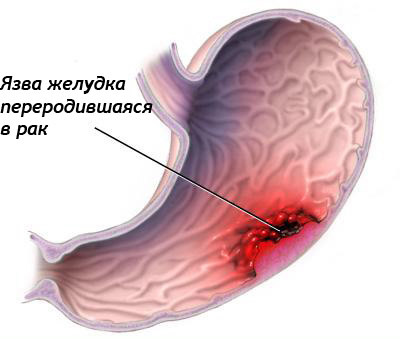

This i like. Cheers!